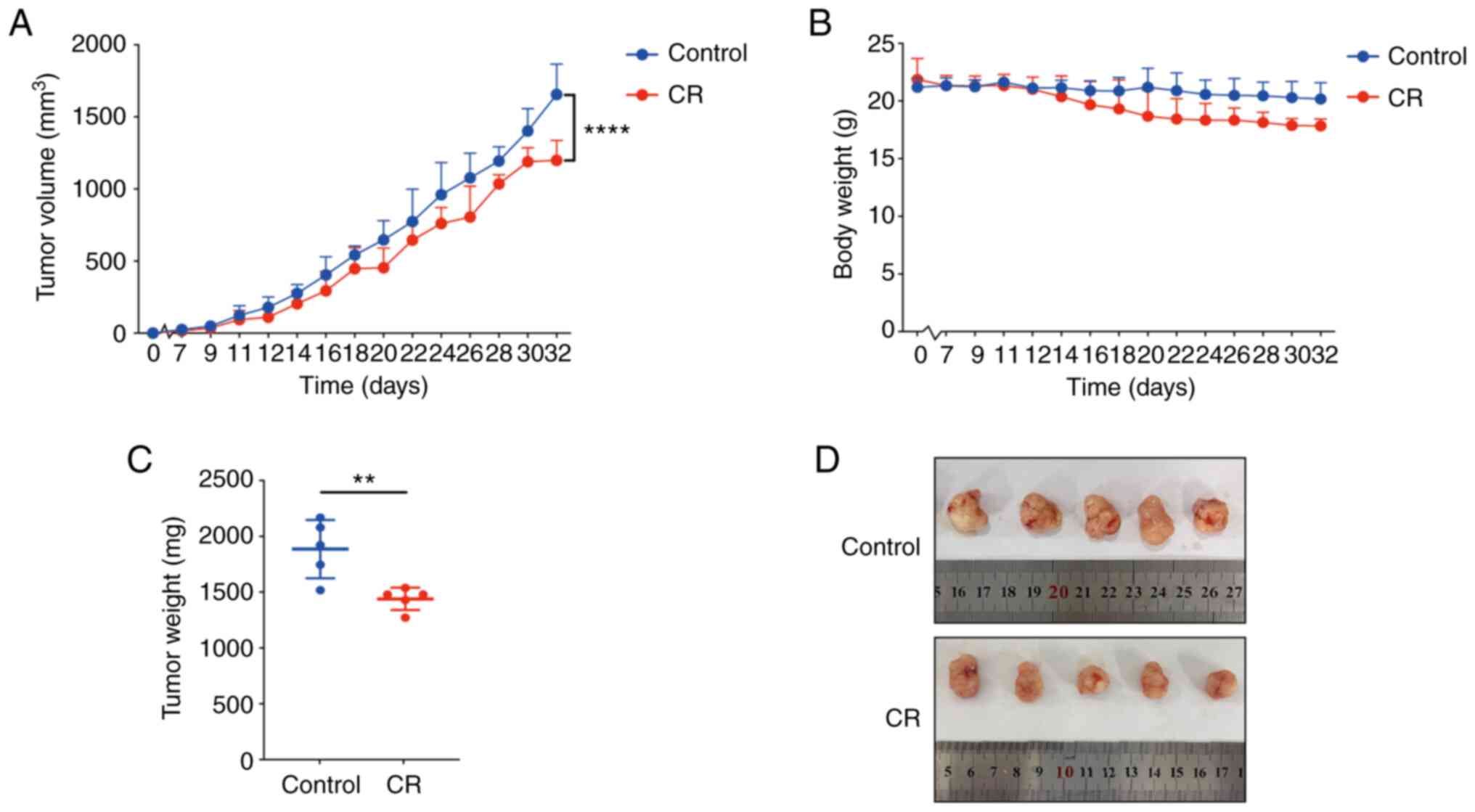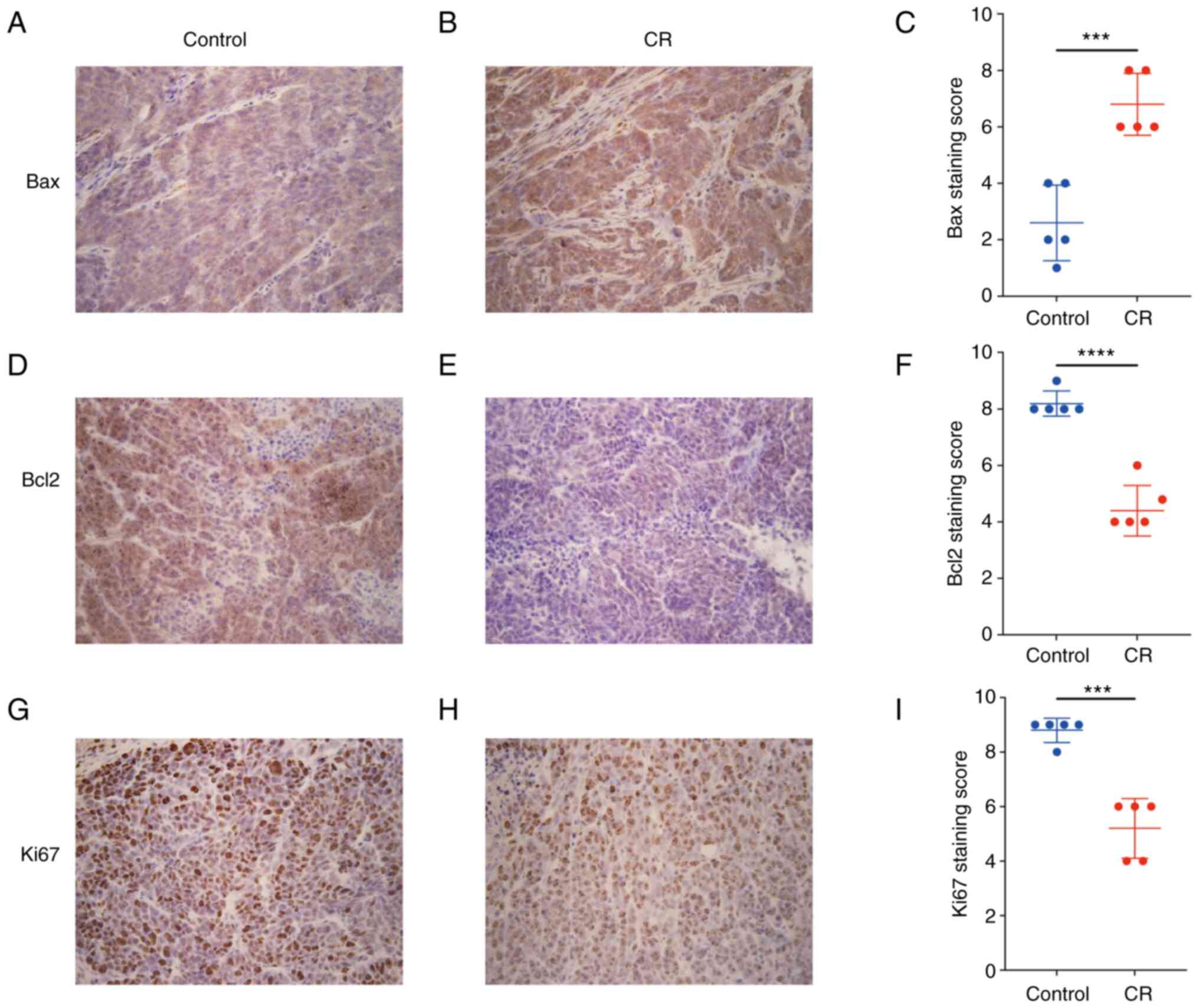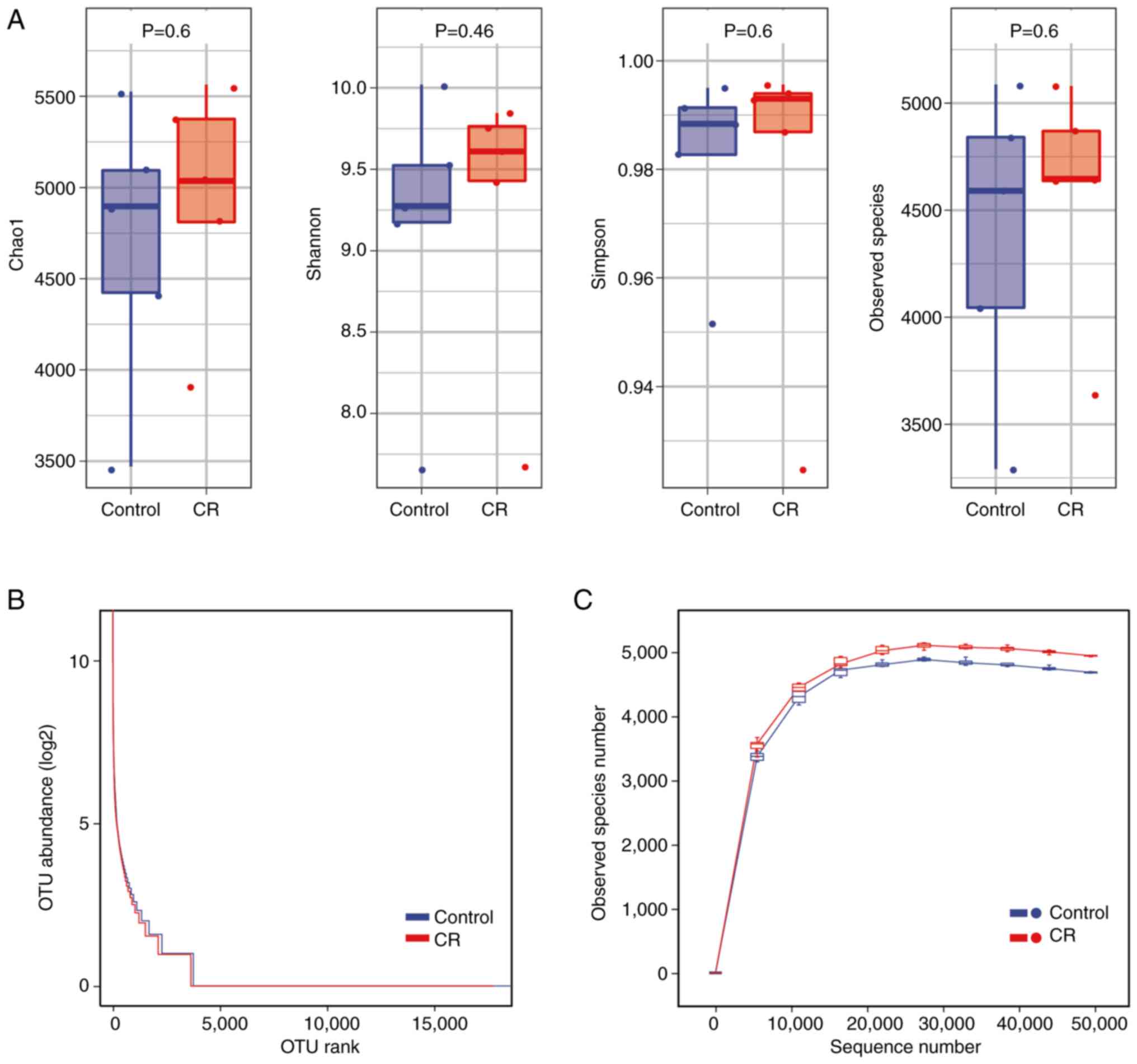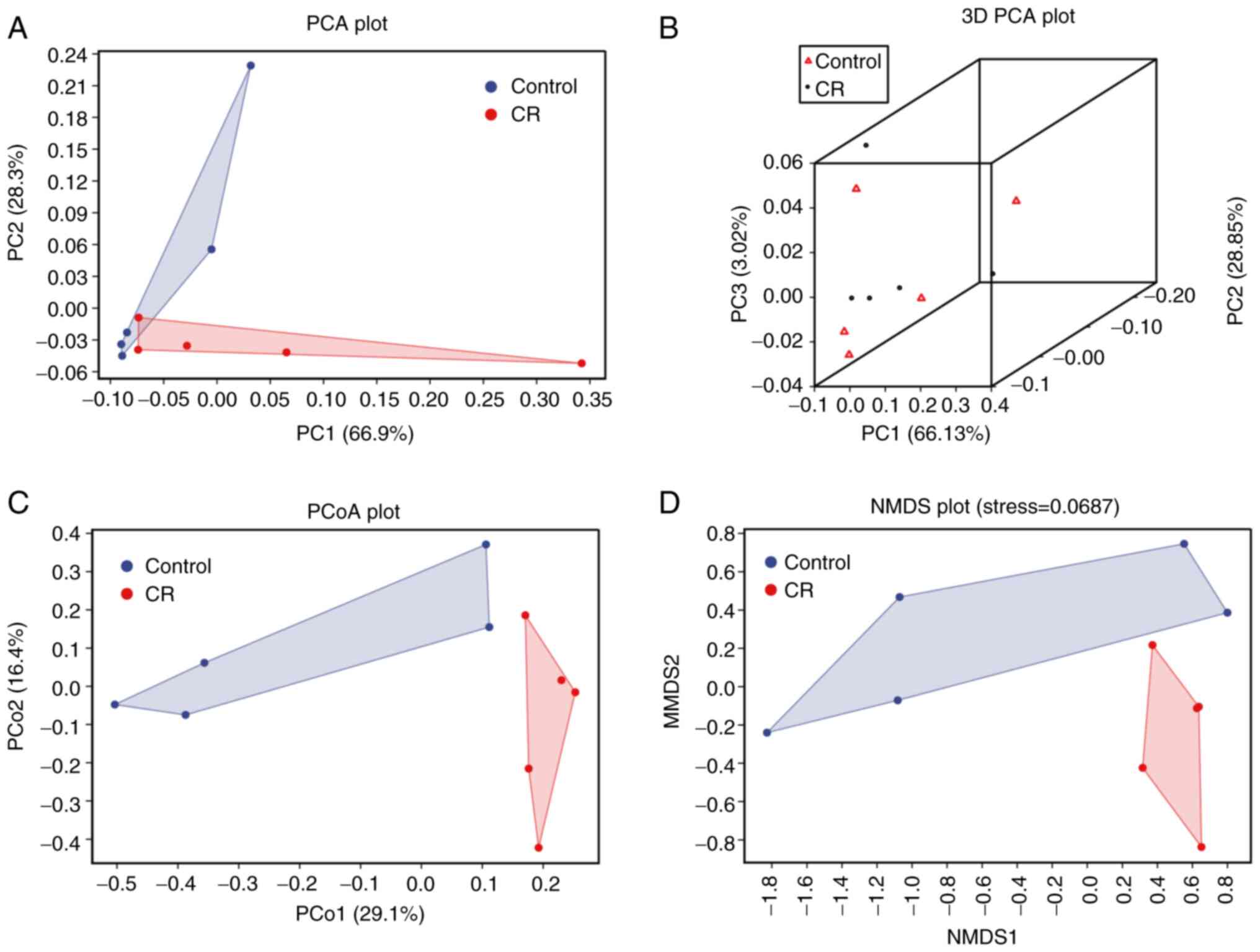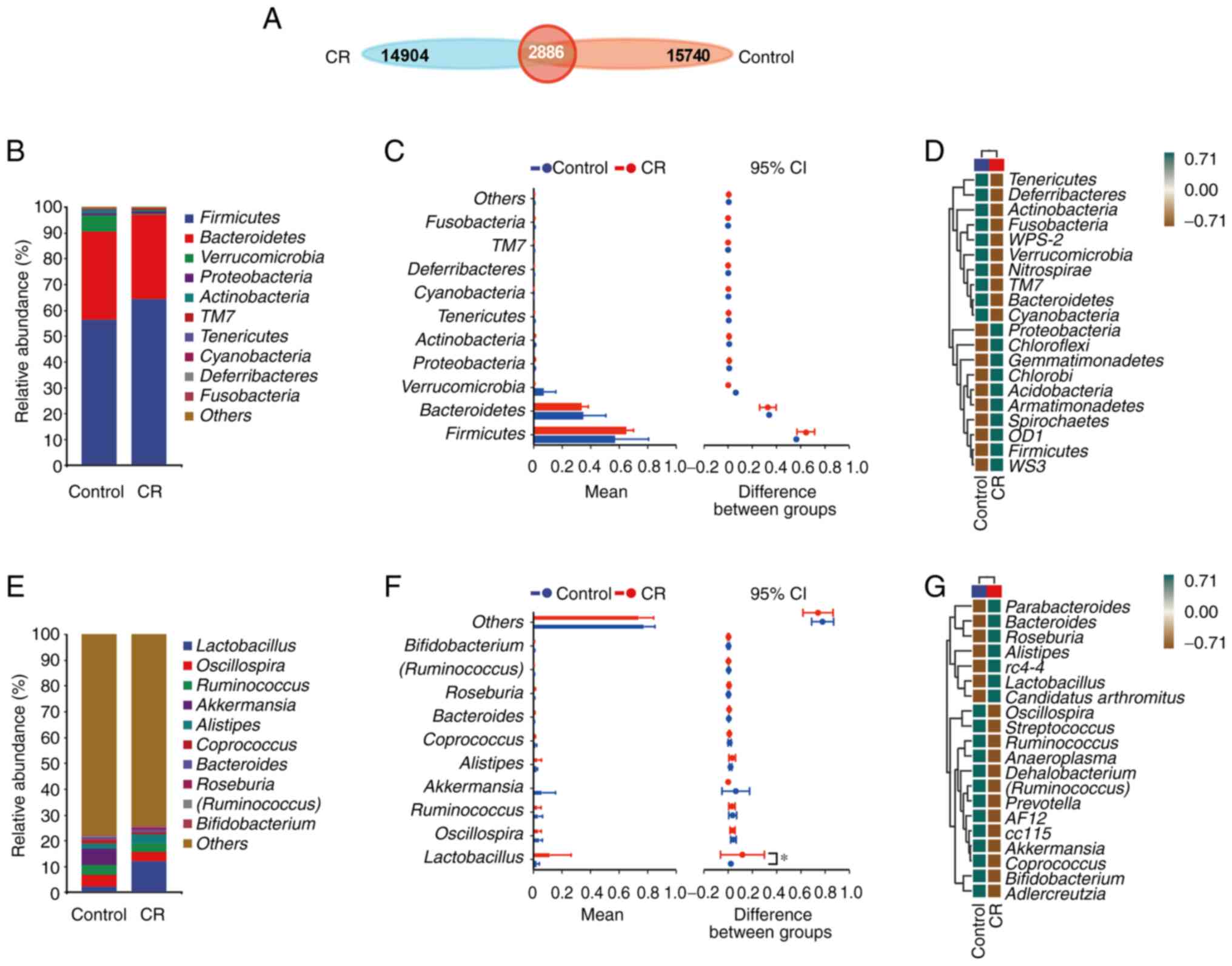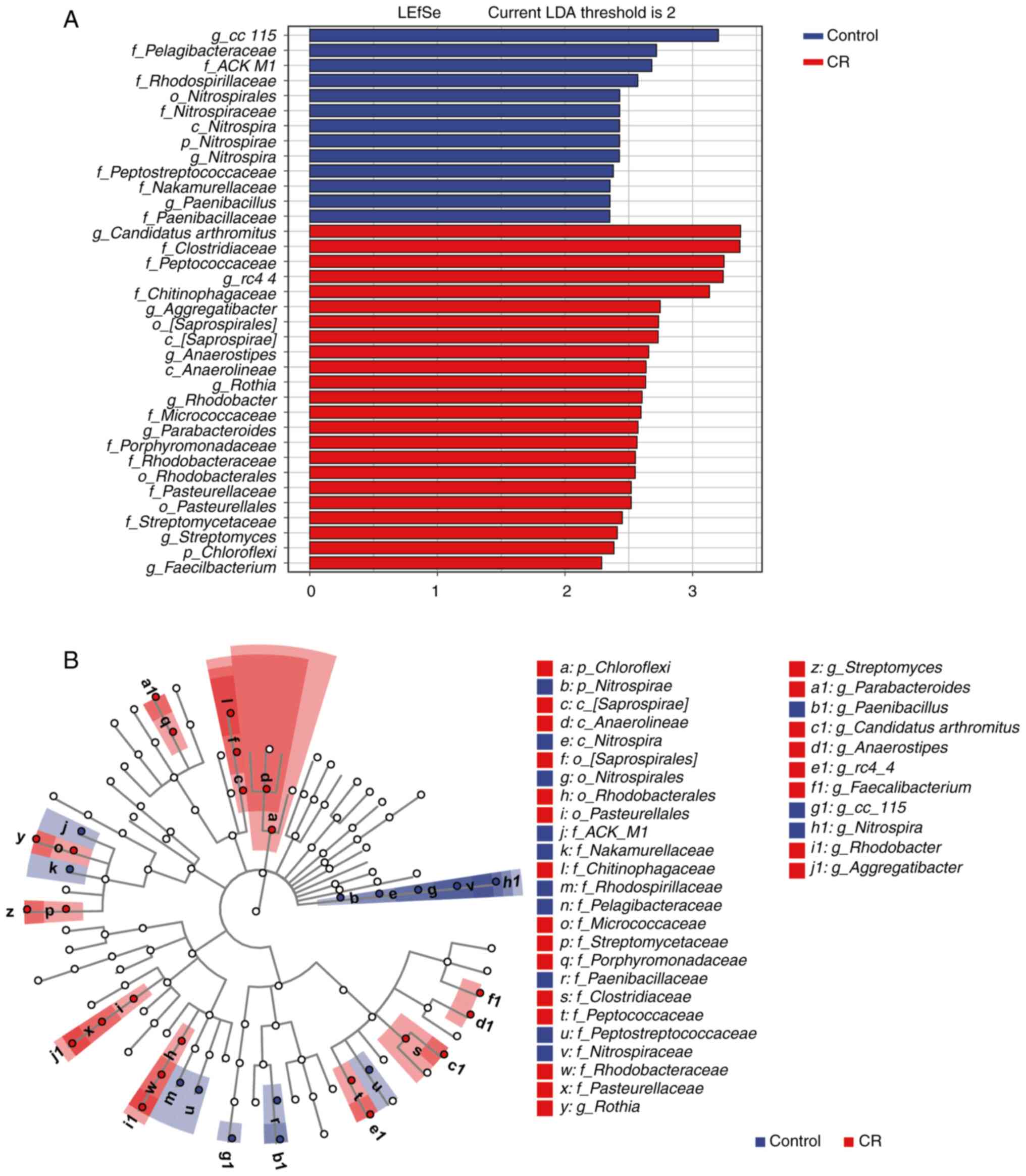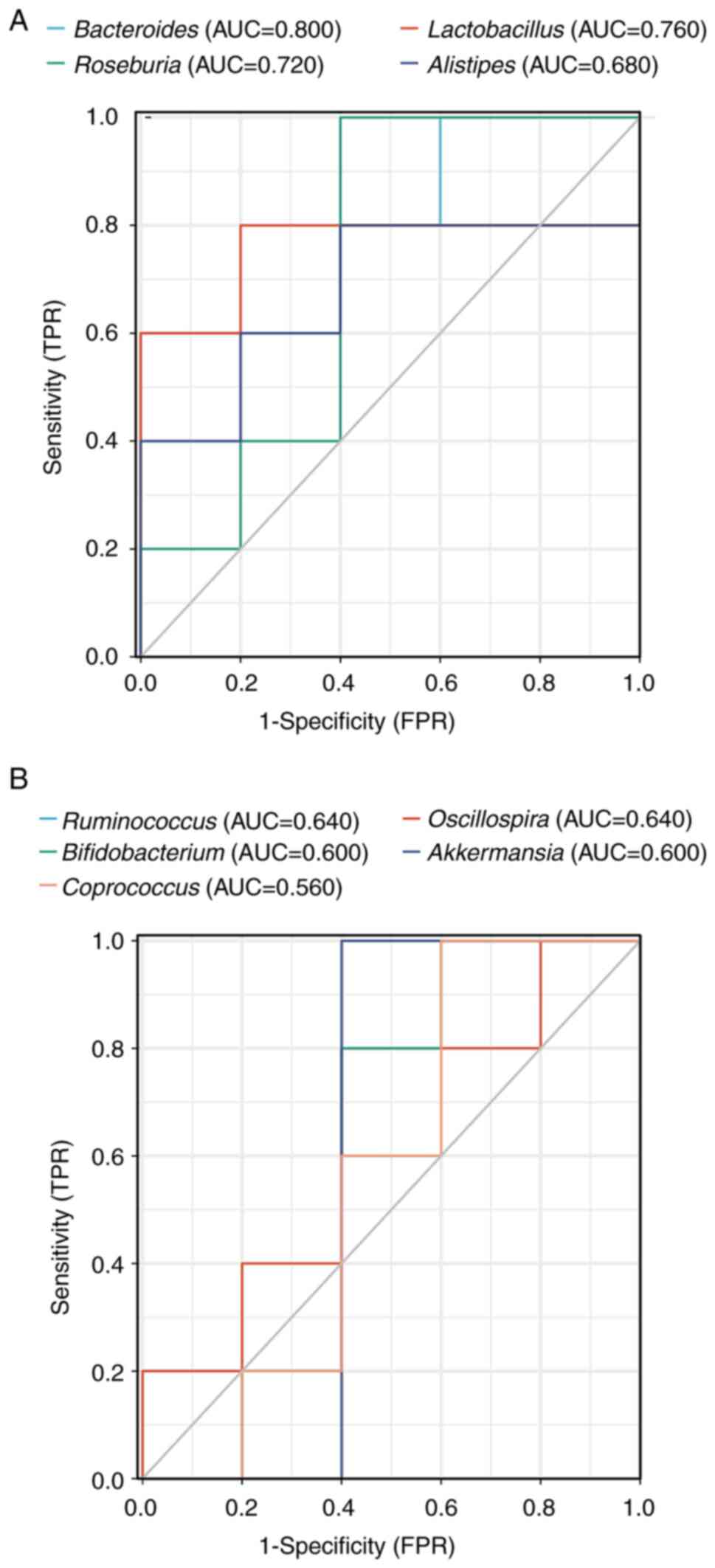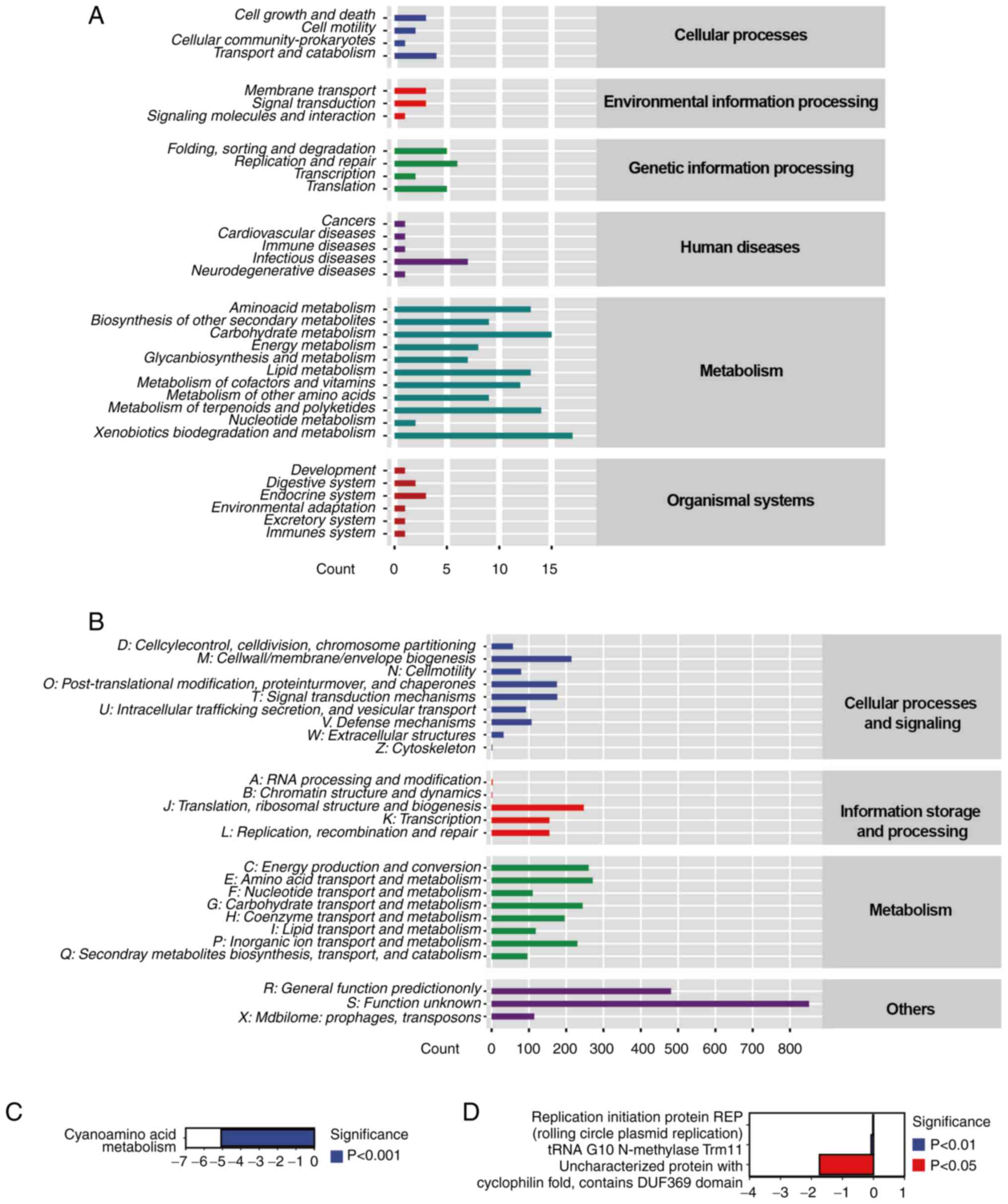|
1
|
Siegel RL, Miller KD, Sauer AG, Fedewa SA,
Butterly LF, Anderson JC, Cercek A, Smith RA and Jemal A:
Colorectal cancer statistics, 2020. CA Cancer J Clin. 70:145–164.
2020.PubMed/NCBI View Article : Google Scholar
|
|
2
|
Tammariello AE and Milner JA: Mouse models
for unraveling the importance of diet in colon cancer prevention. J
Nutr Biochem. 21:77–88. 2010.PubMed/NCBI View Article : Google Scholar
|
|
3
|
Currais P, Rosa I and Claro I: Colorectal
cancer carcinogenesis: From bench to bedside. World J Gastrointest
Oncol. 14:654–663. 2022.PubMed/NCBI View Article : Google Scholar
|
|
4
|
Hursting SD, Lavigne JA, Berrigan D,
Perkins SN and Barrett JC: Calorie restriction, aging, and cancer
prevention: Mechanisms of action and applicability to humans. Annu
Rev Med. 54:131–152. 2003.PubMed/NCBI View Article : Google Scholar
|
|
5
|
Bull MJ and Plummer NT: Part 1: The human
gut microbiome in health and disease. Integr Med (Encinitas).
13:17–22. 2014.PubMed/NCBI
|
|
6
|
Clay SL, Fonseca-Pereira D and Garrett WS:
Colorectal cancer: The facts in the case of the microbiota. J Clin
Invest. 132(e155101)2022.PubMed/NCBI View Article : Google Scholar
|
|
7
|
Khosravi AD, Seyed-Mohammadi S, Teimoori A
and Dezfuli AA: The role of microbiota in colorectal cancer. Folia
Microbiol (Praha). 67:683–691. 2022.PubMed/NCBI View Article : Google Scholar
|
|
8
|
Bradbury KE, Murphy N and Key TJ: Diet and
colorectal cancer in UK Biobank: A prospective study. Int J
Epidemiol. 49:246–258. 2020.PubMed/NCBI View Article : Google Scholar
|
|
9
|
Bullman S, Pedamallu CS, Sicinska E,
Clancy TE, Zhang X, Cai D, Neuberg D, Huang K, Guevara F, Nelson T,
et al: Analysis of fusobacterium persistence and antibiotic
response in colorectal cancer. Science. 358:1443–1448.
2017.PubMed/NCBI View Article : Google Scholar
|
|
10
|
Sanchez-Alcoholado L, Laborda-Illanes A,
Otero A, Ordóñez R, González-González A, Plaza-Andrades I,
Ramos-Molina B, Gómez-Millán J and Queipo-Ortuño MI: Relationships
of gut microbiota composition, short-chain fatty acids and
polyamines with the pathological response to neoadjuvant
radiochemotherapy in colorectal cancer patients. Int J Mol Sci.
22(9549)2021.PubMed/NCBI View Article : Google Scholar
|
|
11
|
Ren J, Ding L, Zhang D, Shi G, Xu Q, Shen
S, Wang Y, Wang T and Hou Y: Carcinoma-associated fibroblasts
promote the stemness and chemoresistance of colorectal cancer by
transferring exosomal lncRNA H19. Theranostics. 8:3932–3948.
2018.PubMed/NCBI View Article : Google Scholar
|
|
12
|
Toivonen RK, Emani R, Munukka E, Rintala
A, Laiho A, Pietilä S, Pursiheimo JP, Soidinsalo P, Linhala M,
Eerola E, et al: Fermentable fibres condition colon microbiota and
promote diabetogenesis in NOD mice. Diabetologia. 57:2183–2192.
2014.PubMed/NCBI View Article : Google Scholar
|
|
13
|
Guo Z, Zhang X, Zhu H, Zhong N, Luo X,
Zhang Y, Tu F, Zhong J, Wang X, He J and Huang L: TELO2 induced
progression of colorectal cancer by binding with RICTOR through
mTORC2. Oncol Rep. 45:523–534. 2021.PubMed/NCBI View Article : Google Scholar
|
|
14
|
Wang F, Wu X, Li Y, Cao X, Zhang C and Gao
Y: PFKFB4 as a promising biomarker to predict a poor prognosis in
patients with gastric cancer. Oncol Lett. 21(296)2021.PubMed/NCBI View Article : Google Scholar
|
|
15
|
Callahan BJ, McMurdie PJ, Rosen MJ, Han
AW, Johnson AJ and Holmes SP: DADA2: High-resolution sample
inference from Illumina amplicon data. Nat Methods. 13:581–583.
2016.PubMed/NCBI View Article : Google Scholar
|
|
16
|
Rognes T, Flouri T, Nichols B, Quince C
and Mahé F: VSEARCH: A versatile open source tool for metagenomics.
PeerJ. 4(e2584)2016.PubMed/NCBI View Article : Google Scholar
|
|
17
|
Bolyen E, Rideout JR, Dillon MR, Bokulich
NA, Abnet CC, Al-Ghalith GA, Alexander H, Alm EJ, Arumugam M,
Asnicar F, et al: Reproducible, interactive, scalable and
extensible microbiome data science using qiime 2. Nat Biotechnol.
37:852–857. 2019.PubMed/NCBI View Article : Google Scholar
|
|
18
|
Nipperess DA and Matsen FA IV: The mean
and variance of phylogenetic diversity under rarefaction. Methods
Ecol Evol. 4:566–572. 2013.PubMed/NCBI View Article : Google Scholar
|
|
19
|
Edgar RC: UPARSE: Highly accurate OTU
sequences from microbial amplicon reads. Nat Methods. 10:996–998.
2013.PubMed/NCBI View Article : Google Scholar
|
|
20
|
Rastelli E, Corinaldesi C, Dell'Anno A,
Tangherlini M, Martire ML, Nishizawa M, Nomaki H, Nunoura T and
Danovaro T: Drivers of bacterial alpha- and beta-diversity patterns
and functioning in subsurface hadal sediments. Front Microbiol.
10(2609)2019.PubMed/NCBI View Article : Google Scholar
|
|
21
|
Segata N, Izard J, Waldron L, Gevers D,
Miropolsky L, Garrett WS and Huttenhower C: Metagenomic biomarker
discovery and explanation. Genome Biol. 12(R60)2011.PubMed/NCBI View Article : Google Scholar
|
|
22
|
Obuchowski NA and Bullen JA: Receiver
operating characteristic (ROC) curves: Review of methods with
applications in diagnostic medicine. Phys Med Biol.
63(07TR01)2018.PubMed/NCBI View Article : Google Scholar
|
|
23
|
Galperin MY, Kristensen DM, Makarova KS,
Wolf YI and Koonin EV: Microbial genome analysis: The COG approach.
Brief Bioinform. 20:1063–1070. 2019.PubMed/NCBI View Article : Google Scholar
|
|
24
|
Stockman MC, Thomas D, Burke J and Apovian
CM: Intermittent fasting: Is the wait worth the weight? Curr Obes
Rep. 7:172–185. 2018.PubMed/NCBI View Article : Google Scholar
|
|
25
|
Golbidi S, Daiber A, Korac B, Li H, Essop
MF and Laher I: Health benefits of fasting and caloric restriction.
Curr Diab Rep. 17(123)2017.PubMed/NCBI View Article : Google Scholar
|
|
26
|
Napoleao A, Fernandes L, Miranda C and
Marum AP: Effects of calorie restriction on health span and insulin
resistance: Classic calorie restriction diet Vs. Ketosis-Inducing
diet. Nutrients. 13(1302)2021.PubMed/NCBI View Article : Google Scholar
|
|
27
|
Choi IY, Piccio L, Childress P, Bollman B,
Ghosh A, Brandhorst S, Suarez J, Michalsen A, Cross AH, Morgan TE,
et al: A diet mimicking fasting promotes regeneration and reduces
autoimmunity and multiple sclerosis symptoms. Cell Rep.
15:2136–2146. 2016.PubMed/NCBI View Article : Google Scholar
|
|
28
|
Wahl D, Solon-Biet SM, Wang QP, Wali JA,
Pulpitel T, Clark X, Raubenheimer D, Senior AM, Sinclair DA, Coone
GJ, et al: Comparing the effects of low-protein and
high-carbohydrate diets and caloric restriction on brain aging in
mice. Cell Rep. 25:2234–2243 e6. 2018.PubMed/NCBI View Article : Google Scholar
|
|
29
|
Ikizler TA, Robinson-Cohen C, Ellis C,
Headley SAE, Tuttle K, Wood RJ, Evans EE, Milch CM, Moody KA,
Germain M, et al: Metabolic effects of diet and exercise in
patients with moderate to severe Ckd: A randomized clinical trial.
J Am Soc Nephrol. 29:250–259. 2018.PubMed/NCBI View Article : Google Scholar
|
|
30
|
Kraus WE, Bhapkar M, Huffman KM, Pieper
CF, Das SK, Redman LM, Villareal DT, Rochon J, Roberts SB, Ravussin
E, et al: 2 years of calorie restriction and cardiometabolic risk
(Calerie): Exploratory outcomes of a multicentre, phase 2,
randomised controlled trial. Lancet Diabetes Endocrinol. 7:673–683.
2019.PubMed/NCBI View Article : Google Scholar
|
|
31
|
Pak HH, Haws SA, Green CL, Koller M,
Lavarias MT, Richardson NE, Yang SE, Dumas SN, Sonsalla M, Bray L,
et al: Fasting drives the metabolic, molecular and geroprotective
effects of a calorie-restricted diet in mice. Nat Metab.
3:1327–1341. 2021.PubMed/NCBI View Article : Google Scholar
|
|
32
|
Tang Z, Ming Y, Wu M, Jing J, Xu S, Li H
and Zhu Y: Effects of caloric restriction and rope-skipping
exercise on cardiometabolic health: A pilot randomized controlled
trial in young adults. Nutrients. 13(3222)2021.PubMed/NCBI View Article : Google Scholar
|
|
33
|
Sbierski-Kind J, Grenkowitz S,
Schlickeiser S, Sandforth A, Friedrich M, Kunkel D, Glauben R,
Brachs S, Mai K, Thürmer A, et al: Effects of caloric restriction
on the gut microbiome are linked with immune senescence.
Microbiome. 10(57)2022.PubMed/NCBI View Article : Google Scholar
|
|
34
|
Matson V, Chervin CS and Gajewski TF:
Cancer and the microbiome-influence of the commensal microbiota on
cancer, immune responses, and immunotherapy. Gastroenterology.
160:600–613. 2021.PubMed/NCBI View Article : Google Scholar
|
|
35
|
Park EM, Chelvanambi M, Bhutiani N,
Kroemer G, Zitvogel L and Wargo JA: Targeting the gut and tumor
microbiota in cancer. Nat Med. 28:690–703. 2022.PubMed/NCBI View Article : Google Scholar
|
|
36
|
Lu Y, Yuan X, Wang M, He Z, Li H, Wang J
and Li Q: Gut microbiota influence immunotherapy responses:
mechanisms and therapeutic strategies. J Hematol Oncol.
15(47)2022.PubMed/NCBI View Article : Google Scholar
|
|
37
|
Kim CS, Cha L, Sim M, Jung S, Chun WY,
Baik HW and Shin DM: Probiotic Supplementation improves cognitive
function and mood with changes in gut microbiota in
community-dwelling older adults: A randomized, double-blind,
placebo-controlled, multicenter trial. J Gerontol A Biol Sci Med
Sci. 76:32–40. 2021.PubMed/NCBI View Article : Google Scholar
|
|
38
|
Sergeev IN, Aljutaily T, Walton G and
Huarte E: Effects of synbiotic supplement on human gut microbiota,
body composition and weight loss in obesity. Nutrients.
12(222)2020.PubMed/NCBI View Article : Google Scholar
|
|
39
|
Kang DW, Adams JB, Coleman DM, Pollard EL,
Maldonado J, McDonough-Means S, Caporaso JG and Krajmalnik-Brown R:
Long-term benefit of microbiota transfer therapy on autism symptoms
and gut microbiota. Sci Rep. 9(5821)2019.PubMed/NCBI View Article : Google Scholar
|
|
40
|
Ley RE, Backhed F, Turnbaugh P, Lozupone
CA, Knight RD and Gordon JI: Obesity alters gut microbial ecology.
Proc Natl Acad Sci U S A. 102:11070–11075. 2005.PubMed/NCBI View Article : Google Scholar
|
|
41
|
Locantore P, Del Gatto V, Gelli S,
Paragliola RM and Pontecorvi A: The interplay between immune system
and microbiota in osteoporosis. Mediators Inflamm.
2020(3686749)2020.PubMed/NCBI View Article : Google Scholar
|
|
42
|
Cho I and Blaser MJ: The human microbiome:
At the interface of health and disease. Nat Rev Genet. 13:260–270.
2012.PubMed/NCBI View Article : Google Scholar
|
|
43
|
Human Microbiome Project Consortium.
Structure, function and diversity of the healthy human microbiome.
Nature. 486:207–214. 2012.PubMed/NCBI View Article : Google Scholar
|
|
44
|
Li MM, Zhou Y, Zuo L, Nie D and Li XA:
Dietary fiber regulates intestinal flora and suppresses liver and
systemic inflammation to alleviate liver fibrosis in mice.
Nutrition. 81(110959)2021.PubMed/NCBI View Article : Google Scholar
|
|
45
|
Stojanov S, Berlec A and Strukelj B: The
influence of probiotics on the firmicutes/bacteroidetes ratio in
the treatment of obesity and inflammatory bowel disease.
Microorganisms. 8(1715)2020.PubMed/NCBI View Article : Google Scholar
|
|
46
|
Magne F, Gotteland M, Gauthier L, Zazueta
A, Pesoa S, Navarrete P and Balamurugan R: The
firmicutes/bacteroidetes ratio: A relevant marker of gut dysbiosis
in obese patients? Nutrients. 12(1474)2020.PubMed/NCBI View Article : Google Scholar
|
|
47
|
Xia T, Duan W, Zhang Z, Li S, Zhao Y, Geng
B, Zheng Y, Yu J and Wang M: Polyphenol-rich vinegar extract
regulates intestinal microbiota and immunity and prevents
alcohol-induced inflammation in mice. Food Res Int.
140(110064)2021.PubMed/NCBI View Article : Google Scholar
|
|
48
|
Stoeva MK, Garcia-So J, Justice N, Myers
J, Tyagi S, Nemchek M, McMurdie PJ, Kolterman O and Eid J:
Butyrate-producing human gut symbiont, clostridium butyricum, and
its role in health and disease. Gut Microbes. 13:1–28.
2021.PubMed/NCBI View Article : Google Scholar
|
|
49
|
Fujio-Vejar S, Vasquez Y, Morales P, Magne
F, Vera-Wolf P, Ugalde JA, Navarrete P and Gotteland M: The gut
microbiota of healthy chilean subjects reveals a high abundance of
the phylum verrucomicrobia. Front Microbiol. 8(1221)2017.PubMed/NCBI View Article : Google Scholar
|
|
50
|
Jin H and Zhang C: High fat high calories
diet (HFD) increase gut susceptibility to carcinogens by altering
the gut microbial community. J Cancer. 11:4091–4098.
2020.PubMed/NCBI View Article : Google Scholar
|
|
51
|
Lindenberg F, Krych L, Fielden J, Kot W,
Frøkiær H, van Galen G, Nielsen DS and Hansen AK: Expression of
immune regulatory genes correlate with the abundance of specific
Clostridiales and Verrucomicrobia species in the equine ileum and
cecum. Sci Rep. 9(12674)2019.PubMed/NCBI View Article : Google Scholar
|
|
52
|
Wu S, Zhang Y, Ma J, Liu Y, Li W, Wang T,
Xu X, Wang Y, Cheng K and Zhuang R: Interleukin-6 absence triggers
intestinal microbiota dysbiosis and mucosal immunity in mice.
Cytokine. 153(155841)2022.PubMed/NCBI View Article : Google Scholar
|
|
53
|
Bindels LB, Beck R, Schakman O, Martin JC,
Backer FD, Sohet FM, Dewulf EM, Pachikian BD, Neyrinck AM, Thissen
JP, et al: Restoring specific lactobacilli levels decreases
inflammation and muscle atrophy markers in an acute leukemia mouse
model. PLoS One. 7(e37971)2012.PubMed/NCBI View Article : Google Scholar
|
|
54
|
Bindels LB, Porporato P, Dewulf EM, Verrax
J, Neyrinck AM, Martin JC, Scott KP, Calderon PB, Feron O, Muccioli
GG, et al: Gut microbiota-derived propionate reduces cancer cell
proliferation in the liver. Br J Cancer. 107:1337–1344.
2012.PubMed/NCBI View Article : Google Scholar
|
|
55
|
Lin C, Cai X, Zhang J, Wang W, Sheng Q,
Hua H and Zhou X: Role of gut microbiota in the development and
treatment of colorectal cancer. Digestion. 100:72–78.
2019.PubMed/NCBI View Article : Google Scholar
|
|
56
|
Zitomersky NL, Coyne MJ and Comstock LE:
Longitudinal analysis of the prevalence, maintenance, and IgA
response to species of the order Bacteroidales in the human gut.
Infect Immun. 79:2012–2020. 2011.PubMed/NCBI View Article : Google Scholar
|
|
57
|
Machiels K, Joossens M, Sabino J, Preter
VD, Arijs I, Eeckhaut V, Ballet V, Claes K, Immerseel FV, Verbeke
K, et al: A decrease of the butyrate-producing species Roseburia
hominis and Faecalibacterium prausnitzii defines dysbiosis in
patients with ulcerative colitis. Gut. 63:1275–1283.
2014.PubMed/NCBI View Article : Google Scholar
|
|
58
|
Hou YP, He QQ, Ouyang HM, Peng HS, Wang Q,
Li J, Lv XF, Zheng YN, Li SC, Liu HL and Yin AH: Human gut
microbiota associated with obesity in chinese children and
adolescents. Biomed Res Int. 2017(7585989)2017.PubMed/NCBI View Article : Google Scholar
|
|
59
|
Zeng Q, Li D, He Y, LiY Yang Z, Zhao X,
Liu Y, Wang Y, Sun J and Feng X: Discrepant gut microbiota markers
for the classification of obesity-related metabolic abnormalities.
Sci Rep. 9(13424)2019.PubMed/NCBI View Article : Google Scholar
|
|
60
|
Duncan SH, Hold GL, Barcenilla A, Stewart
CS and Flint HJ: Roseburia intestinalis sp. nov., a novel
saccharolytic, butyrate-producing bacterium from human faeces. Int
J Syst Evol Microbiol. 52:1615–1620. 2002.PubMed/NCBI View Article : Google Scholar
|
|
61
|
Tamanai-Shacoori Z, Smida I, Bousarghin L,
Loreal O, Meuric V, Fong SB, Bonnaure-Mallet M and Jolivet-Gougeon
A: Roseburia spp: A marker of health? Future Microbiol. 12:157–170.
2017.PubMed/NCBI View Article : Google Scholar
|
|
62
|
Rajilic-Stojanovic M, Shanahan F, Guarner
F and de Vos WM: Phylogenetic analysis of dysbiosis in ulcerative
colitis during remission. Inflamm Bowel Dis. 19:481–488.
2013.PubMed/NCBI View Article : Google Scholar
|
|
63
|
Takahashi K, Nishida A, Fujimoto T, Fujii
M, Shioya M, Imaeda H, Inatomi O, Bamba S, Sugimoto M and Andoh A:
Reduced abundance of butyrate-producing bacteria species in the
fecal microbial community in crohn's disease. Digestion. 93:59–65.
2016.PubMed/NCBI View Article : Google Scholar
|
|
64
|
Cayetano RDA, Park J, Kim GB, Jung JH and
Kim SH: Enhanced anaerobic digestion of waste-activated sludge via
bioaugmentation strategy-Phylogenetic investigation of communities
by reconstruction of unobserved states (PICRUSt2) analysis through
hydrolytic enzymes and possible linkage to system performance.
Bioresour Technol. 332(125014)2021.PubMed/NCBI View Article : Google Scholar
|
|
65
|
Lu L, Zhao Y, Yi G, Li M, Liao L, Yang C,
Cho C, Zhang B, Zhu J, Zou K and Cheng Q: Quinic acid: A potential
antibiofilm agent against clinical resistant Pseudomonas
aeruginosa. Chin Med. 16(72)2021.PubMed/NCBI View Article : Google Scholar
|
|
66
|
Liang Q, Wang C and Li B: Metabolomic
analysis using liquid chromatography/mass spectrometry for gastric
cancer. Appl Biochem Biotechnol. 176:2170–2184. 2015.PubMed/NCBI View Article : Google Scholar
|
|
67
|
Lee JH, Kim Y, Choi JW and Kim YS: Genetic
variants and risk of gastric cancer: A pathway analysis of a
genome-wide association study. Springerplus. 4(215)2015.PubMed/NCBI View Article : Google Scholar
|
|
68
|
Ruiz-Maso JA, Macho NC, Bordanaba-Ruiseco
L, Espinosa M, Coll M and Del Solar G: Plasmid rolling-circle
replication. Microbiol Spectr. 3(PLAS-0035-2014)2015.PubMed/NCBI View Article : Google Scholar
|
|
69
|
Armengaud J, Urbonavicius J, Fernandez B,
Chaussinand G, Bujnicki JM and Grosjean H: N2-methylation of
guanosine at position 10 in tRNA is catalyzed by a THUMP
domain-containing, S-adenosylmethionine-dependent
methyltransferase, conserved in Archaea and Eukaryota. J Biol Chem.
279:37142–37152. 2004.PubMed/NCBI View Article : Google Scholar
|
|
70
|
Chen D, Jin D, Huang S, Wu J, Xu M, Liu T,
Dong W, Liu X, Wang S, Zhong W, et al: Clostridium butyricum, a
butyrate-producing probiotic, inhibits intestinal tumor development
through modulating Wnt signaling and gut microbiota. Cancer Lett.
469:456–467. 2020.PubMed/NCBI View Article : Google Scholar
|
|
71
|
Sugimura N, Li Q, Chu ESH, Lau HCH, Fong
W, Liu W, Liang C, Nakatsu G, Su ACY, Coker O, et al: Lactobacillus
gallinarum modulates the gut microbiota and produces anti-cancer
metabolites to protect against colorectal tumourigenesis. Gut.
71:2011–2021. 2021.PubMed/NCBI View Article : Google Scholar
|
|
72
|
Wong SH and Yu J: Gut microbiota in
colorectal cancer: Mechanisms of action and clinical applications.
Nat Rev Gastroenterol Hepatol. 16:690–704. 2019.PubMed/NCBI View Article : Google Scholar
|
|
73
|
Perez-Lopez A, Behnsen J, Nuccio SP and
Raffatellu M: Mucosal immunity to pathogenic intestinal bacteria.
Nat Rev Immunol. 16:135–148. 2016.PubMed/NCBI View Article : Google Scholar
|















